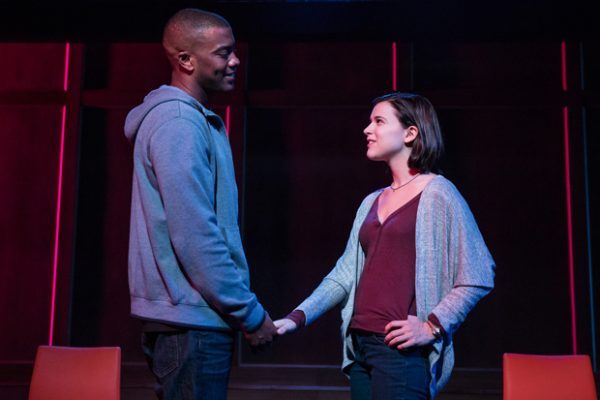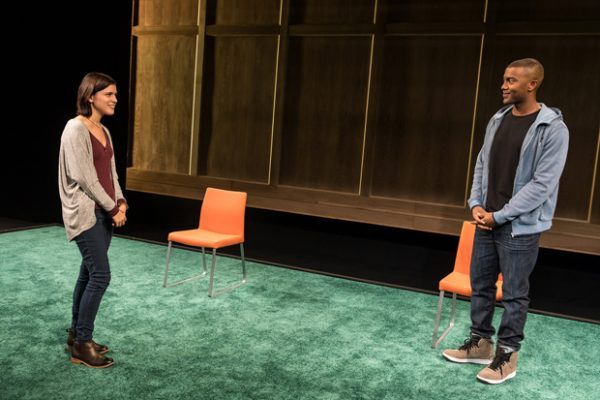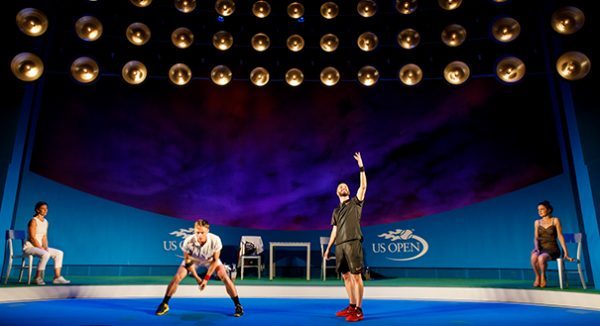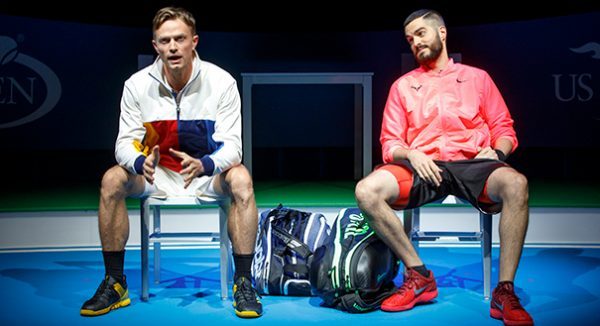
Tom (Joshua Boone) and Amber (Alexandra Socha) cannot quite agree what happened one night in Actually (photo © Matthew Murphy)
ACTUALLY
Manhattan Theatre Club
New York City Center: The Studio at Stage II
Tuesday – Sunday through December 10, $30
212-581-1212
manhattantheatreclub.com
actuallyplay.com
Watching a talky play with relatively few characters, say, only two or four, can be like watching a tennis match. When the writing and directing is exceptional, it’s like seeing a championship bout between Nadal and Federer, Borg and McEnroe, Evert and Navratilova, your head going back and forth as the shifting dialogue consists of aces, expert passing shots, exciting net play, and thrilling overhead smashes. Of course, just as every play is not going to qualify for award status, not every tennis match is going to be memorable, something I can vouch for, having attended the U.S. Open for more than twenty years. Brooklyn-born playwright Anna Ziegler serves up both ends of the spectrum with two current off-Broadway shows, Actually and The Last Match, both of which involve the characters breaking the fourth wall and speaking directly to the audience, with very different results. The Manhattan Theatre Club production of Actually, continuing at City Center’s Stage II through December 10, is a timely, intense look at what actually happened the night two Princeton freshmen, Tom (Joshua Boone) and Amber (Alexandra Socha), hooked up at a party. While Tom believed their coupling was completely consensual, Amber thinks it turned into rape and reported it to the university.

Alexandra Socha and Joshua Boone star in gripping play by Anna Ziegler (photo © Matthew Murphy)
Tom is a black classical pianist who says, “In some ways, I’ve been on trial my entire life.” Amber is white and Jewish, a mediocre squash player who explains, “We all fill some stupid niche, which reduces us to something much less than what we are, but that’s the way it goes.” The play begins with them playing the game Two Truths and a Lie; Tom is reluctant, but Amber demands he participate if he wants to sleep with her. For ninety taut minutes, they reenact events from that night and share their thoughts with the audience, discussing consent, race, religion, Title IX, gender, and other key topics, turning viewers into a kind of jury of public opinion. When Amber says that her default state is “this zone of wanting something and not wanting it at the same time,” it really hits home, getting to the core of how so many people feel. Boone (Holler If You Hear Me, Mother Courage and Her Children) and Socha (Spring Awakening, Fun Home) are outstanding caught up in a long deuce, each one taking, then losing, the advantage as they volley back and forth. Ziegler’s (Photograph 51, Boy) dialogue is sharp and focused, while Obie winner Lileana Blain-Cruz (Pipeline, The Death of the Last Black Man in the Whole Entire World) directs with pinpoint accuracy on Adam Rigg’s spare set. Actually is no mere Bobby Riggs vs. Billie Jean King, he said / she said contest; it is a powerful exploration of possible sexual misconduct in an age when Americans learn more and more about the issue every day, as more and more predators are revealed.

The Last Match takes place during the semifinals of the U.S. Open (photo by Joan Marcus)
THE LAST MATCH
Laura Pels Theatre
Harold and Miriam Steinberg Center for Theatre
111 West 46th St. between Sixth & Seventh Aves.
Tuesday – Sunday through December 23, $79
212-719-1300
www.roundabouttheatre.org
Unfortunately, the Roundabout production of The Last Match, running at the Laura Pels Theatre through December 23, is not nearly as incisive and gripping as Actually. It’s the semifinals at the U.S. Open, and six-time champion Tim Porter (Wilson Bethel), who might be on the downside of his career at the tender age of thirty-four, is playing younger up-and-comer Sergei Sergeyev (Alex Mickiewicz), a hotheaded Russian who wants to dethrone the even-tempered American star and crowd favorite. They serve and volley on Tim Mackabee’s tennis court set, with the familiar blue, white, and green colors of the Open and scoreboards on either side, while Bray Poor’s audio design includes the sound of imaginary swinging rackets striking imaginary yellow balls. In between and during points, Tim and Sergei argue with each other in ways that don’t feel real during a live match; share their thoughts directly with the audience; and reenact scenes from their past, primarily Tim’s relationship with fellow tennis player Mallory (Zoë Winters) as they marry and try to have a baby, and Sergei’s courtship of the fiery Galina (Natalia Payne). The women cheer their partners on from the sides of the stage as the men fight it out. But whereas Amber and Tom in Actually were complex characters who had their charms along with their shortcomings, both gaining the audience’s sympathy at different times, only Mallory is able to elicit much catharsis in The Last Match.

Tim Porter (Wilson Bethel) and Sergei Sergeyev (Alex Mickiewicz) battle it out on court and off in Anna Ziegler play (photo by Joan Marcus)
“You don’t want people to know you’re an asshole. But anyone who does this sport at this level is gigantic asshole of worst gigantic asshole variety,” Sergei says early on, adding, “You have to care only for yourself.” It’s hard to care about Sergei, Galina, and Tim, who are self-obsessed; Ziegler (A Delicate Ship, The Wanderers) and director Gaye Taylor Upchurch (Animal, The Year of Magical Thinking) give them back stories that don’t help humanize them but turn each one into more of a caricature. While Actually made smart, subtle references to societal issues and did not proclaim any grand statements about who was right, The Last Match is melodramatic and obvious, like a love match in tennis. “So many game points, on my racquet,” Sergei says. “This should be my game so many times over. I have earned it! But life does not actually work that way. You actually have to win.” But you’re likely to decide who you want to win from the very start, rendering the competition relatively mute. “Some people don’t even love their babies right away so it’s just relentless and boring. And we already have tennis for that, right?” Mallory asks Tim, who replies. “Well, I don’t find tennis boring.” But any tennis match, like any sporting event, can be relentless and boring. Just like any play.